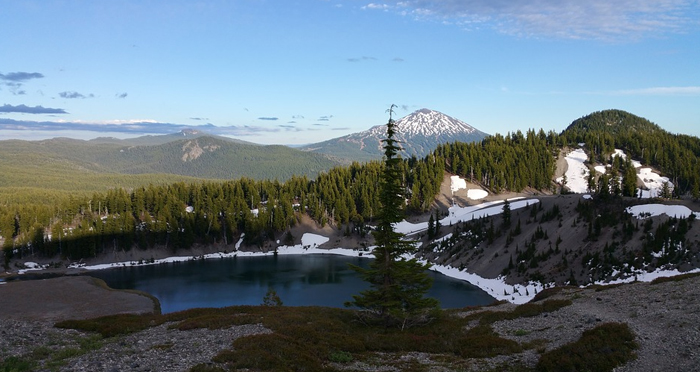The Deschutes and Willamette National Forests have issued a Draft Decision Notice for the Central Cascade Wilderness Strategies Project.
Under the Draft Decision, wilderness day use will be managed with a limited entry permit system at 30 of the 80 trailheads across the Mount Jefferson, Mount Washington and Three Sisters Wilderness areas from the Friday before Memorial Day through September 30 every year beginning in 2020. Some portion of next day or same day permits will continue to be available for individuals to spontaneously enjoy wilderness access at the limited entry trailheads. Overnight backpacking will be managed with a limited entry permit system at all trailheads across the Mount Jefferson, Mount Washington, and Three Sisters Wilderness areas. Waldo Lake and Diamond Peak wilderness trailheads would not be impacted by this decision and will still have free, self-issue, same-day permits available.
“We are delighted to see that a portion of same-day and next-day permits will be available for people who want to head to the wilderness on the spur of the moment,” said Kim McCarrel, spokeswoman for Oregon Equestrian Trails. “Many equestrian trail riders are concerned that the soaring popularity of our wilderness trails is having a detrimental effect on the wilderness experience. While not everyone agrees a permit system is the right answer, most of us believe that steps need to be taken to limit the damage.”
Deschutes National Forest Supervisor John Allen and Willamette National Forest Supervisor Tracy Beck believe this decision strikes a balance between providing access to current users, providing a quality recreation experience, and preserving the opportunity for future users to experience the wilderness character of these areas as intended by Congress.
“While members of the Deschutes Trails Coalition, a homegrown collaboration between local trail user groups, conservation organizations and business, may differ on preferred solutions, we all understand that portions of the Cascade wildernesses like Three Sisters have seen unacceptable impacts to the land, wildlife and wilderness experience,” said Brad Chalfant, Chair of the Deschutes Trails Coalition. “The staff of the Deschutes National Forest are to be applauded for taking a methodical, open and thoughtful approach to developing solutions to ensure that the Wilderness, its resources and experience will continue to be there for our children and generations to come.”
The two forests believe this decision will sustain recreational use and ensure wilderness character is protected for future generations. Visit Bend’s CEO Kevney Dugan said, “We’ve all felt the pinch of increased recreational use of public lands resulting from record growth across the Pacific Northwest, and as community members raising families in Bend, we’re heartened by the Forest Service’s efforts to ensure future growth and associated wilderness use will be managed with both user experience and wilderness health in mind. The Forest Service’s move to help preserve our wilderness areas is aligned with shifts Visit Bend has made in recent years to support a more sustainable model for enjoying Bend’s outdoor spaces.”
The Draft Decision is subject to objection procedures. The public has an opportunity to file an objection within 45 days of the legal notice of the proposed decision. Following objection resolution, the Forest Supervisors will issue a final decision in February of 2019 and implementation is expected to begin in 2020.
Depending upon the outcome of the final Decision the forests will complete the required processes for additional public engagement on permits and any potential fees through the Federal Lands Recreation Enhancement Act.
For more information on the project, visit: https://bit.ly/2K6fAXr
Background: The Deschutes and Willamette National Forests jointly manage four of the wilderness areas with the Willamette National Forest solely managing Waldo Lake Wilderness. In response to increased visitor use and impacts, the two forests are proposing management strategies to sustain long-term recreational access while ensuring the wildernesses character of these areas is protected for future generations.
The Proposed Action went out for public scoping in late May 2017. The Draft Environmental Assessment (EA) was released in April 2018. The Draft EA considered five alternatives, including the no action alternative. Before and during the comment period, the forests hosted four public open houses in Bend, Salem, and Eugene, and attended numerous stakeholder meetings. Hundreds of public comment were received, as well as nearly 5,000 form letters.





